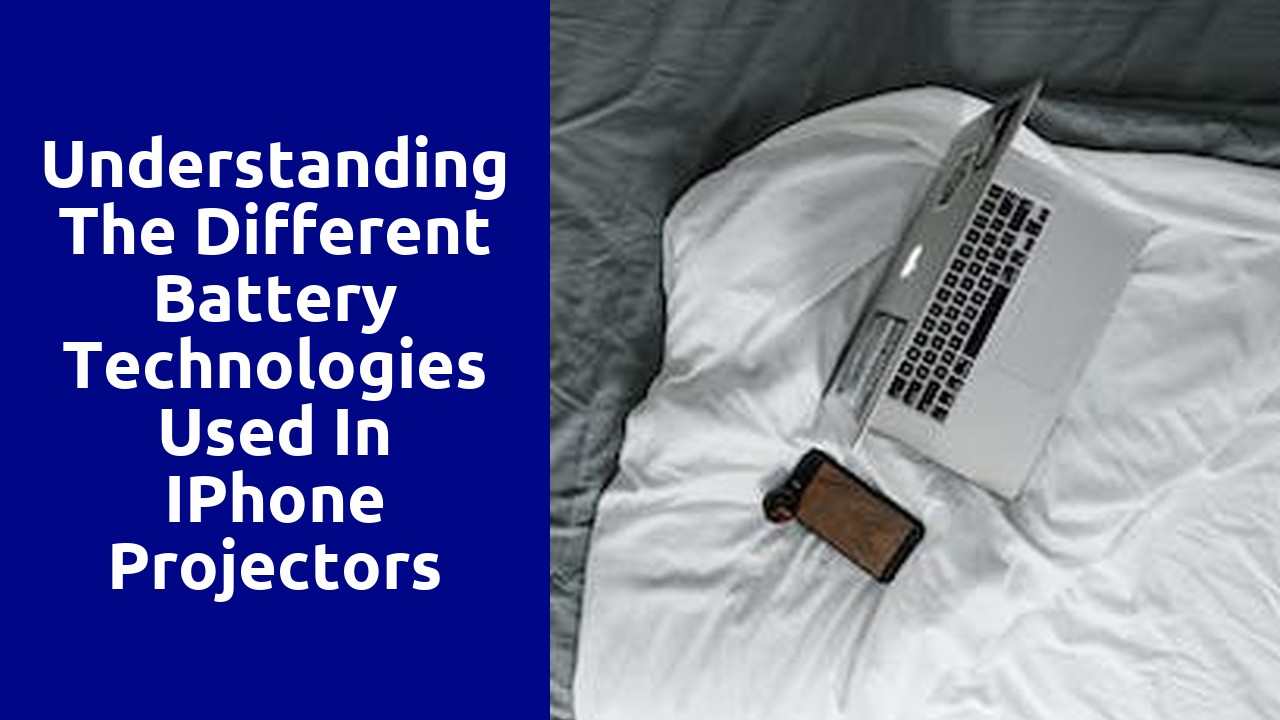

Lithium-ion batteries have become the go-to power source for a wide range of electronic devices. Their compact size, high energy density, and long-lasting performance have made them an ideal choice for iPhone projectors. These batteries have the capacity to store a significant amount of energy and provide a reliable and consistent power supply to the projectors.
One of the key advantages of lithium-ion batteries is their ability to hold a charge for extended periods of time. This is particularly important in iPhone projectors, as they are often used in situations where a continuous power source may not be readily available. Whether it's for outdoor presentations, business meetings, or even movie nights with friends, lithium-ion batteries ensure that the projector won't run out of power unexpectedly. Additionally, these batteries have a low self-discharge rate, meaning they can hold their charge for longer periods without needing to be recharged frequently. This makes them highly convenient and reliable for users who rely on their iPhone projectors for various purposes.
Battery capacity plays a crucial role in determining the overall performance and runtime of iPhone projectors. This essential factor directly influences how long you can enjoy your favorite movies or give presentations on the go. With a higher battery capacity, you can expect a longer runtime, enabling you to accomplish more tasks without the hassle of constantly recharging. On the other hand, a lower battery capacity may limit your usage time and require more frequent charging, which could be inconvenient, especially during extended usage periods.
When considering battery capacity, it is important to understand the trade-offs it presents. Higher capacity batteries tend to be bulkier and heavier, which may impact the overall portability of the iPhone projector. Therefore, finding the right balance between battery capacity and portability is crucial to ensure a satisfactory user experience. Additionally, it is essential to consider the power consumption of the projector itself, as different models and brands can have varying power requirements, influencing the overall runtime even with similar battery capacity.
As a proud owner of an iPhone projector, you understand the importance of maximizing the longevity of your device's battery. With a few simple tips and tricks, you can ensure that your projector remains powered up for longer periods, allowing you to enjoy uninterrupted projections and presentations.
One effective way to extend your iPhone projector's battery life is by adjusting the screen brightness. By lowering the brightness level, you can significantly reduce the amount of power consumed by the device. This can be done by accessing the settings menu and adjusting the brightness slider to a level that is comfortable for your viewing experience. Not only will this help conserve battery life, but it will also prevent eye strain during extended usage.
In the world of iPhone projectors, Battery Management Systems (BMS) play a crucial role in optimizing both performance and safety. These systems are specifically designed to ensure the proper functioning and longevity of the projector's battery, while also prioritizing user safety. By carefully monitoring and controlling various electrical parameters, BMS technologies enable iPhone projectors to deliver a seamless experience to users, without compromising on safety.
One key aspect of BMS is its ability to regulate the charging and discharging processes of the iPhone projector's battery. Through intelligent algorithms and advanced sensors, the BMS ensures that the battery operates within its optimal voltage and temperature range. This not only maximizes the battery's performance, but also safeguards it from potential damage caused by overcharging or overheating. As a result, users can enjoy longer sessions of projection without any interruptions, while feeling confident that their device is protected against any safety hazards.
As technology continues to advance at a rapid pace, we find ourselves more reliant on our smartphones for various tasks. The iPhone, in particular, has become a multipurpose device that allows us to communicate, browse the internet, watch videos, and even project presentations onto a larger screen. iPhone projectors have gained popularity in recent years, as they provide a convenient way to showcase content in a professional setting or enjoy a movie night at home. However, one aspect that often goes unnoticed is the importance of conserving battery power in these projectors.
When using an iPhone projector, it is crucial to consider energy efficiency as it directly impacts the overall performance and usability of the device. Battery life plays a significant role in determining how long you can project your content without interruptions or the need to recharge. A shorter battery life not only hampers your experience but also limits the versatility and convenience that an iPhone projector can offer. Therefore, it is essential to explore ways to conserve battery power in order to maximize the functionality and longevity of these projectors.
Lithium-ion batteries have been the standard choice for powering various portable electronic devices for decades. However, as technology continues to advance, the limitations of lithium-ion batteries are becoming more evident. This has led researchers and manufacturers to explore alternative battery technologies that could replace lithium-ion batteries in iPhone projectors, offering improved performance and longer battery life.
One promising alternative is solid-state batteries. Unlike lithium-ion batteries that use liquid electrolytes, solid-state batteries use solid electrolytes. This results in higher energy density, improved safety, and longer cycle life. Researchers have made substantial progress in developing solid-state batteries with impressive performance characteristics, making them a viable option for powering future iPhone projectors. Additionally, solid-state batteries have the potential to be more environmentally friendly compared to lithium-ion batteries, reducing the environmental impact of electronic devices.